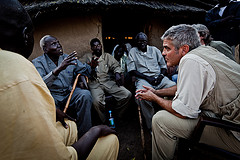
The Enough Project is both lauded and criticized for its work with celebrities. Naysayers claim that celebrity engagement oversimplifies the issues, while supporters point out the benefits that come from high-profile activists promoting awareness of important issues and gaining the ears of high level policy-makers.
What many followers fail to realize is that celebrity engagement is typically much less spontaneous than it looks when the glitterati tweet and photo ops appear. A recent research report by the University of Manchester’s Dr. Dan Brockington analyzes the nuances of celebrity engagement and seeks to define what “Getting It” really means.
For his research, Brockington, who earned his PhD in anthropology, interviewed over 90 actors within the non-profit and celebrity sectors in the U.S. and U.K., including campaigners, journalists, agents, publicists, and other researchers.
The Enough Project, co-founded by “celebrity-advocacy king John Prendergast” has pioneered in the field of celebrity engagement, especially in cultivating the NGO-celebrity relationship.
Brockington’s paper explores the nature of that relationship, explaining the mutually beneficial ways in which celebrities and their causes can interact. The crux of the relationship is authenticity – if the public doesn’t believe the celebrity is genuinely engaged they will not “buy in.” But Brockington notes that “the associations have to feel authentic for the public figures too.”
Brockington lists the different types of authenticity:
- Expert or Experiential Authority: an intellectual knowledge or practical life experience that provides special insight into other people's condition.
- Affinity: some sort of structural similarity with others (being a parent, living on the wrong side of unequal power structures).
- Empathy: the shared emotions one has with others as a result of some shared experience or affinity.
- Sympathy: the emotions provoked in you by another's fate.
Most celebrities don’t claim to have expert authority on the issues their non-profit of choice addresses. Instead, a celebrity’s strength is connecting with fans by making complex issues accessible. Ironically, celebrities—whose film roles rely on their talent but whose stardom comes from their ability to convince the world that they’re “just like us” —are uniquely equipped to bridge the gap between policy jargon and meaningful reality.
A prime example of this is Robin Wright, who is best known for roles in “Forrest Gump,” “The Princess Bride,” “Moneyball,” and the upcoming “The Girl with the Dragon Tattoo.” In August, she traveled to eastern Congo with the Enough Project, and followed it up with a week-long whirlwind D.C. advocacy blitz that saw her speaking to students, senators, State Department staffers, and major media outlets.
On November 1, TIME.com published an op-ed by Robin Wright (“Put an end to blood minerals: Why we all have a role in Congo’s conflict”) and premiered an Enough Project video diary of Robin’s interactions with Congolese people affected by the global trade in conflict minerals that is a key driver for ongoing conflict there.
Through the Enough Project’s video, blog series, and interactive travel diary, people all over the world can follow Robin’s physical, emotional, and intellectual journey—from horror to sympathy to rage to understanding to action—and see themselves in her. The average viewer and Robin are worlds apart, but a good communications strategy can connect anyone with Robin’s experience and heartfelt call to action.
Celebrities can also get unique access to powerbrokers. In addressing this point in his paper, Brockington quoted an anonymous source in Washington:
You might be able to meet with someone lower down in the office but suddenly you are meeting with the chief of staff or with the principal instead of a staff member two or three levels below because you are accompanied by a celebrity. You also might be able to get a hearing on Capitol Hill because one of those testifying would be a celebrity…That happens all the time. (18)
But once a star gets the access, it is the policy expert’s turn to shine. During Robin Wright’s trip to D.C. in September, she and Enough Field Researcher Fidel Bafilemba were invited to be guests on Al Jazeera English’s “The Stream,” an interactive live TV show. While Wright’s name and presence certainly lent attraction to the producers, Bafilemba captivated audiences through his passionate expertise.
“All too often, people forget that high-profile artists are artists,” said FilmAid's Liz Manne in a FastCompany article. “And because they're not policy wonks, they may have a unique way of looking at something and crystallizing it in a way that a policy wonk couldn’t. Engage with that.”
After a trip to Uganda with Prendergast, Ryan Gosling brought such an artistic angle to Raise Hope for Congo’s advocacy by directing a video. And in the case of the Satellite Sentinel Project, George Clooney both co-founded and continues to support the project’s efforts to end mass atrocities in Sudan and South Sudan, as he made clear in a recent cover story in Parade Magazine.
The ideal NGO-celebrity relationship is mutually beneficial and brings out the best of both sides, with the policy team providing the expertise and organizing trips and the celebrities generating attention and bringing their artistic creativity to the project. It is the non-profit’s responsibility to foster this relationship for the ultimate benefit of their cause.
Photo: During a trip to South Sudan, George Clooney and John Prendergast speak to formerly displaced people in the town of Abyei. (Tim Freccia / Enough Project)

